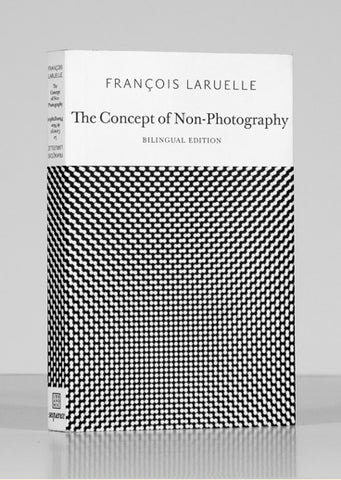François Laruelle: The Concept of Non-Photography (2011) [English]
Filed under book | Tags: · art, non-philosophy, philosophy, philosophy of art, photography, science

Myriads of negatives tell of the world, speaking among themselves, constituting a vast conversation, filling a photosphere that is located nowhere. But one single photo is enough to express the real that all photographers aspire one day to capture, without ever quite succeeding in doing so. Nevertheless, this real cohabits intimately with negatives, with clichés as embedded in our lives as they are imperceptible. Photographs are the thousand flat facets of an ungraspable identity that only shines – and sometimes very faintly – through something else. What more is there to a photo than a curious and prurient glance? And yet it is also a fascinating secret.
The Concept of Non-Photography develops a rigorous new thinking of the photograph in its relation to science, philosophy and art, and introduces the reader to all of the key concepts of Laruelle’s ‘non-philosophy’.
Translated from French by Robin Mackay
Publisher Urbanomic, United Kingdom, and Sequence Press, New York, 2011
ISBN 0983216916, 9780983216919
143 pages
review (Catherine Kron, DisMagazine)
publisher
publisher
google books
Download (English section of the book only; removed by the publisher on 2012-6-13)
Charles Bazerman: Shaping Written Knowledge: The Genre and Activity of the Experimental Article in Science (1988)
Filed under book | Tags: · epistemology, history of science, knowledge production, linguistics, literature, physics, rhetorics, science, semiotics, social science, spectroscopy, theory, writing

The immense force of scientific knowledge in our world has in recent years commanded the attention of a number of scholarly disciplines, ranging from the history of science to literary theory, from philosophy to the teaching of writing. Each foray into the language of science, however, has been motivated by the discipline and school of the researcher. Shaping Written Knowledge confronts scientific language more directly, by making its special character the real center of the inquiry. Original and extensive, this work will be of great interest to scholars concerned with the sociology and history of science, language theory, the history of literacy, the rhetoric of knowledge, technical writing, and the teaching of composition.
The emergence of the experimental article in science, Bazerman shows, is a response to the social and rhetorical situation of seventeenth- and eighteenth-century natural philosophy activated by the need to communicate findings and the exigencies of conflict that arise from communication. The appearance of the argumentative forms of scientific writing are coincident with the rise of the scientific community and the development of experimental procedures. All three interactively structure each other. Bazerman shows that later developments of the experimental article, in both the physical and social sciences of the twentieth century, have been made within the contexts of various disciplines. An understanding of what forces have shaped the experimental report, what functions the features were designed to serve, and the impact of rhetoric on the rest of scientific activity help to evaluate all statements of knowledge and increase our ability to make intelligent writing choices.
Edited for digital presentation by Patricia Klei
Publisher University of Wisconsin Press, Madison, Wisconsin, 1988
ISBN 0299116905, 9780299116903
356 pages
publisher
ebook publisher
google books
PDF (updated on 2012-6-13)
PDF (alt)
The Rutherford Journal, Vol 1-4, incl. Alan Turing web-book (2005-2012)
Filed under journal | Tags: · computing, history of computing, history of science, history of technology, philosophy of science, philosophy of technology, science, technology

The Rutherford Journal publishes invited articles from leading international scholars.
The New Zealand Journal for the History and Philosophy of Science and Technology
Editor Jack Copeland
Publisher Department of Philosophy, The University of Canterbury, New Zealand
ISSN 1177-1380
View online (HTML articles)
View online (Issue 4: Alan Turing web-book)

